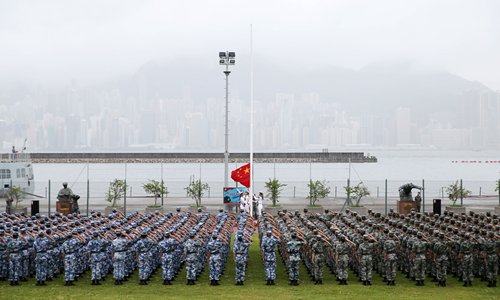HOME >> CHINA
Hong Kong mob gets harsh warning
By Li Ruohan Source:Global Times Published: 2019/9/3 23:38:40
Radical protesters show clear signs of color revolution: spokesperson

A national flag-raising ceremony is held at the Ngong Shuen Chau barracks of the Hong Kong Garrison of the Chinese People's Liberation Army (PLA) in Hong Kong, South China, Aug. 30, 2019. Photo: Xinhua
Chinese State Council's Hong Kong and Macao Affairs Office on Tuesday issued harsh warnings to radical protesters, saying some of the radical protesters have shown clear signs of color revolution and terrorism.
The behaviors of some radical protesters have far exceeded the scope of normal assemblies and carried clear signs of terrorism, said Yang Guang, spokesperson of the office, at a press conference in Beijing on Tuesday.
Rioters injured police, attacked people, used offensive and deadly weapons and disclosed information of police and their families. The actions of a few mobs constitute violent crimes in any country, any area, under any legal system, Yang noted at the press conference.
The five demands raised by radical protesters in Hong Kong are not appeals but blatant political threats, Yang noted.
Yang called on Hong Kong residents to separate peaceful protests from violent crimes, and to say "no" to violence.
Tian Feilong, an associate professor at Beihang University in Beijing and an expert on Hong Kong studies, said that the spokesperson's words served as a stern warning to radical protesters, as the situation has escalated to a matter of national and political security.
The stern warning could also come with a powerful toolkit to maintain the rule of law in the city and protect the interests of Hong Kong residents, Tian added.
For instance, the SAR chief executive could invoke the Emergency Regulations Ordinance and impose a curfew in certain areas based on the Public Order Ordinance, Tian explained.
Xu Luying, another spokesperson of the office, said at the press conference that deploying the Chinese People's Liberation Army's (PLA) Hong Kong Garrison to maintain social order in the region does not mean an end to the "one country, two systems."
The remarks were made as violent protests entered their 14th week in the Hong Kong Special Administrative Region (HKSAR) and triggered discussions of a state of emergency in the region.
Regardless of whether the garrison is deployed in a state of emergency or dispatched by the central government under a request from the HKSAR for disaster relief and to maintain security, the dispatch of troops is within the Basic Law and part of the framework of "one country, two systems," said Xu.
If turmoil that threatens national sovereignty or security occurs in Hong Kong and the region cannot control it, the central government will not just sit idly. The duty of the PLA garrison in Hong Kong is to safeguard national sovereignty, security, and the territorial integrity in accordance with laws, Xu noted.
The remarks show the central government's resolve to safeguard the mechanism in a legal and responsible manner, analysts said.
Hong Kong is part of China and should be protected by the PLA garrison, Victor Chan, vice chairman of the Hong Kong Association of Young Commentators, told the Global Times on Tuesday.
Chan noted that if such extreme actions continue from opposition groups, the regional government will also reinforce its countermeasures.
Posted in: SOCIETY,HK/MACAO/TAIWAN,CHINA FOCUS